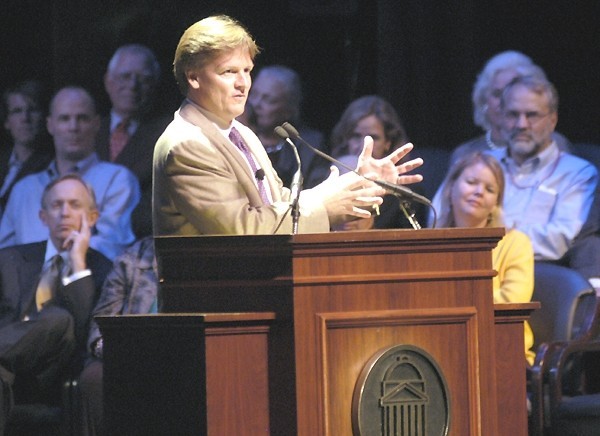
Lewis lectures on baseball, economics
Author and columnist Michael Lewis was the featured speaker inthe Tolleson Lecture last night. The lecture was part of the2004-2005 Tate Lecture Series.
Lewis spoke on the experience of writing his 2003 bookMoneyball: The Art of Winning an Unfair Game.
“Seldom have I had the opportunity to make a fool out ofmyself live,” said Lewis about the difference between writingand speaking.
Lewis started the night by briefly comparing baseball’scurrent setting to other sports such as the NBA and the NFL. Hepointed to lack of a salary cap as the main difference MLB has withthe other organizations. Because of this, Lewis believes that”rich teams keep getting richer, poor teams keep gettingpoorer” in baseball.
For his latest book, Lewis spent a season with the OaklandAthletics to examine the team’s unorthodox strategies. Healso spent a brief time with the Boston Red Sox, the Toronto BlueJays and the Texas Rangers. However, the new book revolves mainlyaround the A’s methodology.
The A’s, Lewis explained, look at statistics in anunconditional manner and base their strategy around statistics thatare not given much weight by other major league teams such as totalnumber of walks and on base percentage.
“Control of the strike zone and the ability to drawwalks” are the most important qualities for a player topossess after examining stats according to Lewis.
The strategy, Lewis explained, has worked for the A’s asthey have enjoyed recent success even though they have not spent asmuch money as teams such as the New York Yankees and Boston RedSox.
Currently, baseball statistics focus on the sensational plays,Lewis believes.
“People who [do] sensational things tend to beovervalued,” he said. “Anything that a player does thathas a stat attached to it gets valued highly because of thatstat.”
In that regard, Lewis compared the situation in baseball to thatof Wall Street.
He went on to explain that the A’s management was seekingplayers that were less than stellar physically. The scouts weightedspecific statistics more than the shape a player was in or theplayer’s looks.
“Players who were good looking were overvalued,” hesaid.
Lewis estimates that about 10 percent of the players in themajor league are overpaid. The A’s have takennon-recognizable players and turned in successful seasons. Lewisequated that A’s players with people in the lower sectors ofthe economy that are viewed as “replaceable parts.”
The A’s take what they can afford and still find successdespite the fact that they possess no franchise player according toLewis.
“Other teams [have] a propensity to overpay,” hesaid.
Lewis said the book “became not just aboutbaseball…but about markets and how they work and don’twork.”
He said he chose baseball because the two qualities that makebaseball easily dissected analytical are that it’s”easy to attribute blame” and the “sample sizesare large enough to examine statistics.”
During the lecture a light spontaneously sent sparks flying intothe back area of the stage causing some brief concern.
Lewis handled it coolly by saying, “I knew the Rangerswould show up,” referring to the division rivalry between theA’s, the team his book focuses on, and the Texas Rangers.
Lewis is currently a columnist for Bloomberg News and awriter for The New York Times Magazine.
Aside from writing Moneyball: The Art of Winning an UnfairGame which spent 62 weeks on the New York Times’best-seller list, Lewis is also the author of other best-sellingbooks including Liar’s Poker, Trial Fever, The New NewThing, and Next: The Future Just Happened.
He was born in New Orleans, earned a Bachelor’s degree inart history from Princeton and a Master’s in economics fromthe London School of Economics. Lewis currently resides inBerkeley, Calif.








